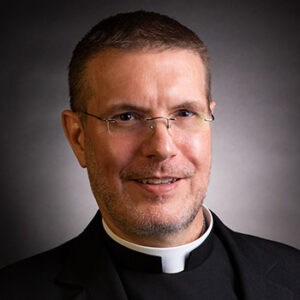DEAR FATHER | Only God knows the state of a person’s soul at death
A loved one who was living with someone outside of marriage recently died. Does the Church teach that people living in mortal sin go to hell?

One of the fears people carry after the death of a loved one who wasn’t living according to Church teaching is that he or she didn’t go to heaven. It is an understandable fear. We believe as a Church that it is vitally important to follow the teachings of Christ. We have also heavily emphasized the danger of mortal sin and, at least in the past, not always done a very good job of explaining what mortal sin actually is. As a result, we look at someone’s external situation and assume we know the state of their soul. But we don’t.
According to the Catechism of the Catholic Church, a mortal sin “destroys charity in the heart of man by a grave violation of God’s law; it turns man away from God, who is his ultimate end and beatitude, by preferring an inferior good to Him…Mortal sin…necessitates a new initiative of God’s mercy and a conversion of heart that is normally accomplished within the sacrament of reconciliation” (1855-57). In other words, a mortal sin is a complete turning away from God in one’s heart. It is a rejection of God’s salvation in favor of evil.
Certain important conditions need to be simultaneously present for a sin to be mortal, however. First, it must involve grave matter. Stealing a candy bar is not a mortal sin, but stealing someone’s only source of livelihood would be. Secondly, there needs to be full knowledge of the seriousness of the act. A person must understand that what he or she is doing is gravely sinful for it to be mortal. A child who fires a weapon doesn’t have the same understanding that an adult has. Finally, there needs to be full freedom to commit the act. If someone is forced into it, or commits the act due to mental illness, addiction, habit, anxiety or sudden pain/anger, then the act remains grave, but the guilt of the individual person is reduced to a lesser (i.e. venial) sin.
For that reason, if we are aware that someone has committed a grave act, even on an ongoing basis, we don’t know the state of that person’s relationship with God. A person may love God deeply and pray every day without understanding the gravity of the situation. Or a person may have deep inner wounds or compulsions that make it difficult to change circumstances (or even know that a change is needed). None of this makes a gravely evil act less grave, but it certainly affects how much personal guilt a person carries.
When a loved one who wasn’t living by the Church’s moral teachings dies, we commend that person to God, who is more merciful and loving than we could ever hope to be. We have no idea what passes between God and a human soul at the moment of death. What we do know is that God desires to save each person. He sees the reality of a person’s desire to be good and loving, and He knows what inner struggles a person may have had. Therefore, we trust in God’s mercy and leave the rest to Him.
Father Scott Jones is the episcopal vicar for the Northern Vicariate of the Archdiocese of St. Louis.




